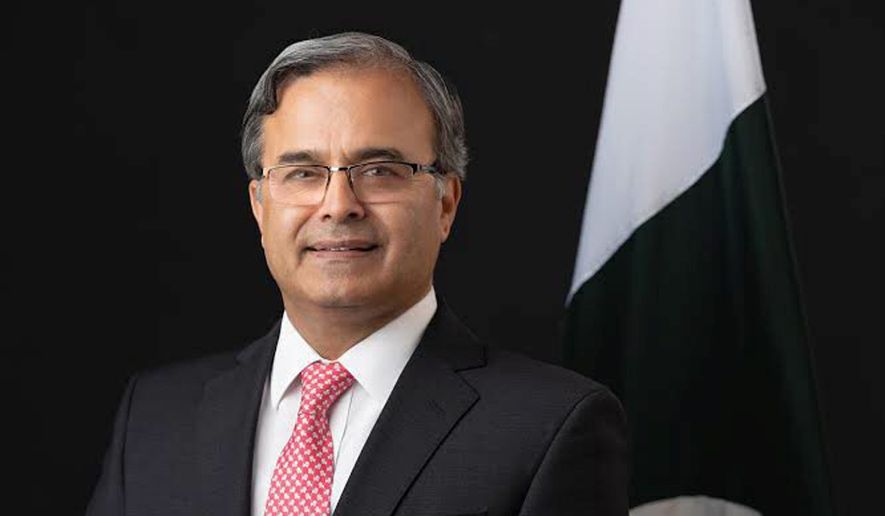Pakistan’s top diplomat in Washington says President Trump’s Afghanistan peace push is working despite the slow start to intra-Afghan talks and ongoing violence between the Taliban and Afghan forces.
In an exclusive interview, Pakistani Ambassador Asad Majeed Khan also said the U.S. will continue to wield influence in Kabul through a critical economic support role after American troops depart under a deal the Trump administration reached with the Taliban back in February.
“The supporters of the process as well as the parties involved will have to figure out how they can best help the Afghans transition from a war-centered economy to a normal economy,” Ambassador Khan told The Washington Times.
“I think that’s where the United States will have an important role to play,” he said in a wide-ranging discussion, during which he also weighed in Pakistan’s tensions with India and on whether it will be easier for Islamabad to deal with Mr. Trump in a second term or a potential Joseph R. Biden administration next year.
Ambassador Khan’s remarks on Afghanistan, which neighbors Pakistan to the north and east, were notably optimistic. He cited Afghan President Ashraf Ghani’s recent decision to order the release of remaining Taliban prisoners held by the U.S.-backed government in Kabul as a major reason to be hopeful.
“If you had asked me a year ago, I probably would not have been as optimistic as I am now,” the ambassador said, adding that the prisoner release plan “bodes well” for the prospect of starting so-called intra-Afghan talks between the Kabul government and the Taliban.
Such talks, which U.S. officials say are essential to peacefully determining what Afghanistan’s future government will look like once U.S. forces leave, have so far struggled to gain steam.
“A lot of energy, frankly, has gone into bringing the parties to the table,” said Ambassador Khan. “At the end of the day, it will be the Afghans who will be living there and need to come to terms with what would allow them to coexist in the same space.”
Over the next four months, the number of American troops in Afghanistan will be reduced to below 5,000. The drawdown comes despite warnings that the area remains a U.S. national security concern. A Pentagon report released last month found that remote areas of the country remain home to “terrorist sanctuaries” and that some Taliban officials cooperate with extremist groups such as al Qaeda.
While such warnings loom in the backdrop, U.S. diplomats have pushed for the start of the intra-Afghan talks as Mr. Trump hold’s to a 2016 campaign promise to end America’s longest war.
Ambassador Khan praised the push, saying it shows the U.S. is committed to the peace process. He asserted that the “Taliban also has shown a clear commitment to stay in the process and also implement and enforce the commitments they made.”
The militant group agreed in February that it would not allow safe haven to extremist groups like al Qaeda and the Islamic State — a promise that has come under scrutiny amid attacks blamed on those groups in recent months.
Ambassador Khan acknowledged, meanwhile, that the impending intra-Afghan dialogue is likely to play out during the heated U.S. presidential election season and that there are uncertainties over how the American vote might impact the peace process.
In diplomatic fashion, he said Pakistan’s relationship with the U.S. will remain strong whoever wins the White House. “We have worked very closely with Republican presidents and we have worked very closely with Democratic presidents,” he said.
The relationship has been marked by ups and downs since Mr. Trump took office. In 2018, the president cut some $300 million in mostly American security aid to Pakistan, claiming Islamabad was not doing enough to combat terrorism. Mr. Trump restored much of the aid a year later and subsequently played warm host to Pakistani Prime Minister Imran Khan at the White House.
Away from U.S.-Pakistan relations, Ambassador Khan was not so optimistic about Islamabad’s ongoing tension India over the disputed territory of Kashmir. He went so far as to say another war between India and Pakistan — both nuclear armed nations — is not out of the question a year after India revoked the special autonomous status of the disputed Kashmir region and began what the ambassador described as an abusive crackdown against civilians in the majority-Muslim province.
He said there is presently a complete lack of dialogue between New Delhi and Islamabad over the region. “You have a border where you have over 2,000 violations since January. The Line of Control is hot,” Ambassador Khan said. “No one can or should rule out the possibility of a larger confrontation.”
• Mike Glenn can be reached at mglenn@washingtontimes.com.




Please read our comment policy before commenting.